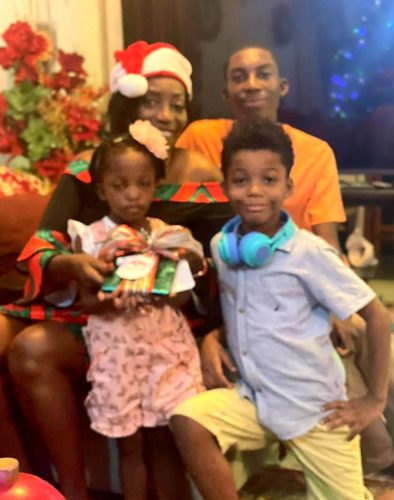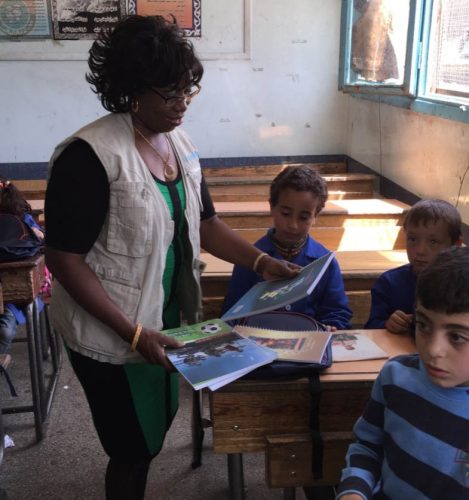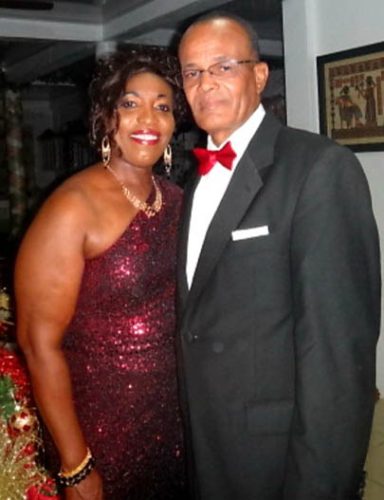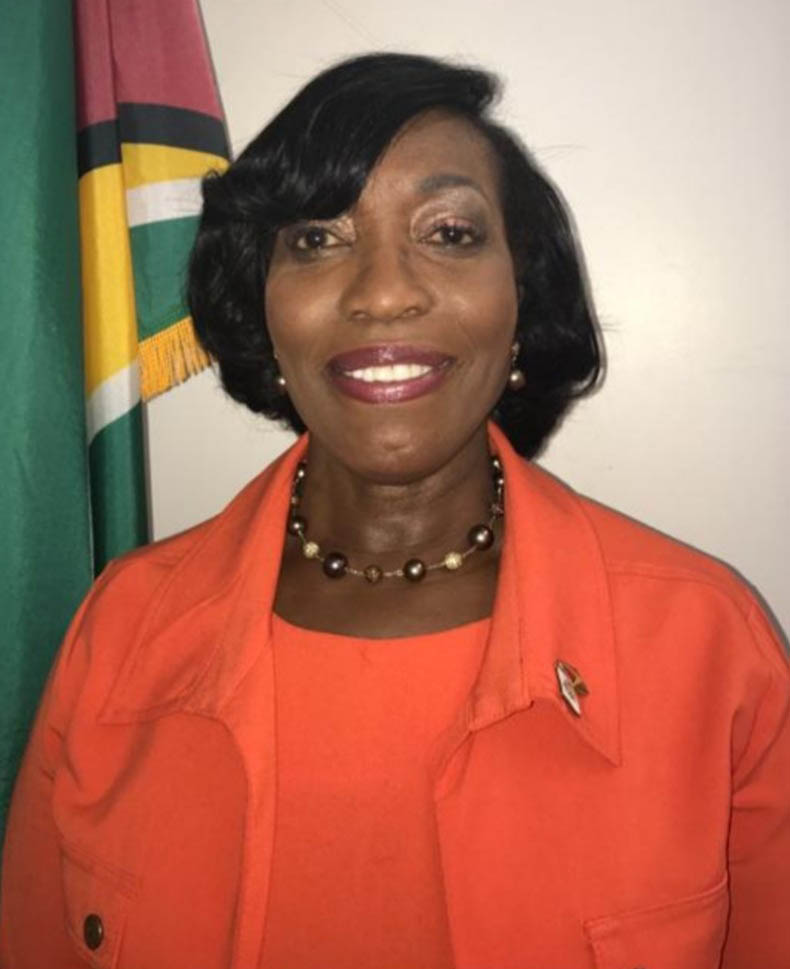Former diplomat, educator and volunteer Barbara Atherley has spent more than half of her working life in either war-torn environments or disaster-prone regions trying to revamp or reform education systems with other social services to either give girls an education or to give the less privileged a chance at an education through user-friendly learning guides.
“I thank God every single day for enabling me to help others. I have seen so many disastrous things and survived. I’ve had colleagues who died in the line of duty. I’ve had colleagues who lost their minds in the line of duty because of the pressures in a war-torn or disaster-prone environment, but God has kept me going,” Atherley told Stabroek Weekend.
Her experiences in Afghanistan after the fall of the Taliban from 2002 to 2005, she said, “brought me closer to God.” She subsequently worked in India, Pakistan and Bangladesh following the December 2004 tsunami that rocked South Asia and subsequently in Mozambique, which was recovering from a war.

Born Barbara Patterson in Charlestown, Georgetown, she grew up in Queenstown, Georgetown. Her mother Miriam Agatha Patterson was a teacher and her father, Joseph Arnold Patterson, a chartered accountant. She was the ninth of ten siblings.
“My parents placed a lot of emphasis on two things, religion and education, which formed the rock of my development,” she said.
She had her primary education at the then St Stephen’s Anglican and St Gabriel’s Anglican schools and secondary education at the now defunct Cambridge Academy.
“Cambridge Academy gave me a very solid foundation in terms of academia and spiritual upliftment, and it inculcated in me respect, honesty and integrity, which my parents also emphasised,” she related. “My dad used to say, ‘On your feet before men. On your knees before God’. That, I think, helped me in my formative years and throughout my life.”
After leaving school, Atherley taught at St George’s Anglican then went on to the then Teachers Training College (TTC) in 1976 and graduated in 1977 as a trained teacher from Cyril Potter College of Education (CPCE). “I was in training during that transition period when training for primary education moved from TTC to CPCE,” she recalled.

Atherley wanted to go into the medical field but changed her mind in high school when a friend was injured. “I saw a lot of blood and I passed out. So, I decided teaching would be it. My mother was the deputy head at St Gabriel’s,” she added.
From CPCE, she was placed at Christ Church Secondary School. In 1980, she obtained a scholarship to pursue a bachelor’s degree in sociology and a minor in management at the University of Guyana (UG). In 1985 she was the best graduating sociology major.
“The one-year Guyana National Service stint I did at UG helped prepare me for the conditions under which I had to live at various times in my working life. It strengthened my love for country, strengthened bonds with friends and made me a very determined person,” she said.
In 1986, Atherley obtained another scholarship to pursue a master’s degree in applied social sciences at the University of the West Indies, Mona Campus, Jamaica.
“Mona was another eye opener. The academic standards were high. I was impressed to see the number of women at the university,” she stated.

After UWI, she joined Guyana’s Minis-try of Education to manage the education component of the human resource development and education sector reform project for the secondary and tertiary levels that was being funded by the Inter-American Development Bank.
“There were several components to the project including infrastructural develop-ment. I looked at the needs of the education system. I looked at universities where the needs could be met and have persons go for the relevant training, whether it was internationally or locally, and I prepared programmes for the development of teachers and education officials,” she related..
While that was ongoing the Primary Education Improvement Project (PEIP) was being developed. When the secondary and tertiary aspect was ending Atherley was transferred to the PEIP. In those projects she was able to put her education and sociology skills into practice.
“However, I felt I was never able to put my managerial skills into practice,” she said.
Having seen a vacancy at the Guyana Management Institute (GMI) for a lecturer/researcher she applied and landed the job. There she tutored middle-level managers from the public service. During that time, she also lectured part time at UG in the Caribbean social structure.
UNICEF Guyana
While at the GMI she joined UNICEF as its first locally recruited education officer.
“It gave me the opportunity to work in every region in the country and to work with the Ministry of Education on education reform and curriculum development. There were many initiatives we introduced at the time,” she recounted.
These included early childhood development that linked the nursery programme with primary education and linked municipal day care centres with the nursery education programme.
As part of her work programme, she looked at the Escuela Nueva (new school) programme in Colombia then took education officials to Guatemala and Ecuador to see how aspects of that programme could satisfy local needs.
“We analysed what was being done for children such as where they spoke their communities’ dialect, but Spanish was the language in which they were taught. In a part of the programme learning guides were introduced in the coffee plantation where children didn’t go to school because they helped in harvesting to support their families,” she said.
As a national education officer, she was involved in training teachers and headteachers to help identify and deal with sensitive social issues often encountered in the classroom.
“The programme we did would have gotten more parents and the community involved in students’ lives. The late Mrs Evelyn Hamilton, then Chief Planning Officer and Mrs Genevieve Whyte-Nedd, then Assistant Chief Education Officer – Nursery and later Deputy Chief Education Officer – Development, were very instrumental in rallying around new ideas and bringing them to the fore in the education system. Early childhood was one area,” she noted.
UNICEF Afghanistan
In 2002 Atherley wanted to gain some international exposure, to see other programmes from a different perspective and to expand her knowledge. There was an opening for an education officer in Afghanistan and she applied and was successful.
“I’m a determined person. Once I decided I was going to step out in the international arena and take up the appointment in Afghanistan, I had to shut up a lot of noises around me. There were those who said, ‘Oh, you shouldn’t go’. ‘It’s dangerous.’ ‘It’s suicidal.’ I held my focus.
I remembered Ruth 2:11 that speaks about leaving your mother, leaving your father, leaving your country and going into areas where you don’t know anyone. That was me leaving the comforts of life. That time my husband Major General Michael Atherley was Chief of Staff of the Guyana Defence Force. My quest for knowledge, for understanding things at a global level led me to take up that challenge, an experience I would never ever regret,” she said.
She recalled arriving at the airport in Afghanistan and seeing soldiers armed to the teeth and staring at her. She said, “I realised I was the only unaccompanied female. When I saw someone holding up a signboard with my name, it was like heaven sent.”
On the way to where she was going to live, she saw bombed out buildings, big craters in the roads and derelict vehicles.
She was based in Herat.
At her first meeting to introduce herself and to discuss the work programme with education officers, heads and deputies of the province, she walked into a room of bearded men in turbans and traditional Afghan outfits.
“When I pushed open the door, I made a right about turn and closed the door behind me. All I saw was a sea of bearded men. I said, ‘God, you brought me here for a purpose. You lead the way.’ I went back in. Then my staff, a male who was also my translator, helped me to introduce myself,” she recalled.
In terms of work she looked at the challenges facing girls’ education in Afghanistan, and how to promote girls’ education.
At the level of UNICEF, the education officers met and decided that rather than having the girls travel the distance to a traditional school building, which could be dangerous, they should be taught within the community. This required training people to work with the girls. When the training programme was to start, those identified were all men.
“I turned to the director and asked, ‘Does this make sense? How would these men train these girls when you know what your culture demands and how would the girls interface with men especially when they reach a certain age?’ He asked me what I wanted him to do. I said, ‘We have to find women to teach the girls.’ He said that women were not educated.”
Atherley told him they were not continuing with the training workshop until they got women to be trained. “That was what we did. The training changed their outlook in terms of teacher and community training. There were a lot more women in training after that,” she said.
Atherley was in Afghanistan from 2002 to 2005. She credited her home and religious upbringing and her stint in the GNS for her being able to survive there. She said, “I lived in a guest house where I was the only female, the only non-Muslim and the only Christian. When Ramadan came around and they were discussing how the cook was going to come in and prepare my meals, I stopped them right away. I said, ‘No. We all live in this guest house. It’s Ramadan and we will all do Ramadan.’ They said it was going to be difficult. I said, ‘Whatever you do I will do.’ That brought a remarkable amount of respect for me. Whenever we went for meetings they let the directors, the government and everyone know that Barbara was doing Ramadan with them. I got all these invitations to go with them to Iftars. That caused me to have a stronger relationship with my own God. I said, if I can do Ramadan, I can do Lent. When everyone went to the mosque, I pulled out my Bible which I had hidden.”
People think that the Afghans are hostile and warlike, she said, but she found them hospitable and endearing. In 2004, when Afghanistan was going to have its first election after the fall of the Taliban, some of the UNICEF staff were assigned to other countries. Atherley was sent to Nepal. “I did six months in Nepal and at the end of the year I returned to Afghanistan,” she said.
Tsunami programme coordinator
After Afghanistan, she was assigned to India as UNICEF’s tsunami programme coordinator, a new programme that dealt with the effects of the December 2004 tsunami which affected part of India, Indonesia and Sri Lanka among other countries. She was based in Chennai covering Tamil Nadu, Kerala and the Andaman and Nicobar Islands.
“Once again, my training in my master’s programme showed that things are better done when they are interlinked and not isolated. I had the opportunity to bring all the programmes, child protection, education, water and sanitation, in a collaborative way to address and alleviate the suffering of people especially the fishermen and the rural communities that were affected by the tsunami,” she said.
This was done under the theme, ‘Build back better’.
Atherley paid a lot of attention to disaster risk reduction and disaster preparedness. “In every sector we ensured there was a plan for dealing with disaster at the managerial level as well as the community level,” she added.
While in India, she also responded to an emergency in Kolkata where she was based for six months.
“I also responded to two disasters in South Asia. I often said that Afghanistan was a man-made disaster. India was a natural disaster. I responded to floods in Sindh in Pakistan and to a cyclone in Bangladesh,” she said.
She pulled together communities and NGO partners and worked out plans on how to deal with the traumatised children.
She also worked in rebuilding and recovery programmes that were either cyclone-resistant or flood resistant in keeping with higher standards.
In 2008 she moved to Mozambique as education officer where she was until 2013.
“In Mozambique I focused again on education reform, as the country was coming out of a war-torn situation. I looked at the curriculum in an emergency setting and at reintroducing systems that were there before… because of war everything had collapsed,” she said.
When she was about to retire and return to Guyana in 2013, the Syria country office needed someone to head the education programme.
“Given my background in dealing with emergencies and disaster management, they asked me if I could assist. They said they needed me like yesterday,” she said.
Syria
Syria was an active war zone.
To get to Damascus, she flew to Lebanon because civilian flights could not go into Damascus.
During the chemical bomb issue in Syria, Atherly was among those who were evacuated from Damascus to Lebanon.
“While we were leaving, we saw some children with backpacks. We stopped and interacted with them. Those children were going across the border to Lebanon with their school books. It showed the high premium they placed on education. I’ve seen a school bombed out in which children died. That school was cleaned for other children. Hurt and torn… you have to encourage children to go to school and when they go, they get killed. You struggle with that but the resilience of community and the people themselves to return to school has really left an indelible mark on my mind,” she said.
Because Syrian children who moved to Syria were taught in the medium of education that was being used in Lebanon, Atherly returned to the Escuela Nueva programme and worked with a team at the education ministry in Syria to develop instructional guides to help the children to continue learning in their language when they crossed the border.
“It was not just about impacting the children who were internally displaced but those who left the country to continue their education,” she noted.
She left Syria in 2015 and retired from the UN system in 2016, having worked with UNICEF for 20 years.
In 2016, the APNU-AFC government appointed her as Guyana’s Consul General in New York.
“I went and I did my duties. I was happy I had a team that was equally interested in modern technology which was what we tried to focus on with the work at the consulate. I am a field person, and at the consulate, we did a community outreach programme to forge unity among Guyanese,” she said.
Then came the Covid-19 pandemic. She said, “I thought I’d worked in difficult duty stations with all the challenges. But with Covid-19, I was in a war-torn situation where I didn’t know the enemy. In Syria, you know when you hear a bomb, you see the smoke, you know the enemy. You know you’re being attacked, and you know where to go. I’ve been in bunkers and I’ve been evacuated. With Covid-19, you didn’t see the enemy. You didn’t know who was attacking, and when and where to retreat. It was one of my busiest periods in terms of work. Apart from all the consular work I was doing, I had to respond to the constant calls of Guyanese living there who had many challenges.
“Thank goodness [for] my UN experience which prepared me for dealing with emergencies… I had meetings with the staff, and we prepared the office for manning the telephone lines and operating from home as though we were in office. We set up a post office box at the consulate,” she recalled.
She was at Consul General from 2016 to 2020.
Atherley is a member of the Georgetown, D’Urban Park Lions Club. “Through that I am able to work within the community, especially with the education and health related projects that we do. I am always with the church. In Mozambique I was on the Anglican Diocese Church board. When I came home, I was on the vestry for St George’s Cathedral. Now I am a member of the Mothers’ Union.
The mother of one and grandmother of three said, “I made my move to work internationally because at the time my son had completed school in Guyana and he had just started university overseas. For me, it was always a way of trying to manage and balance work, family, my community calling in terms of Lionism and my religion. It was not always perfect but I’m satisfied with every step I made.”









